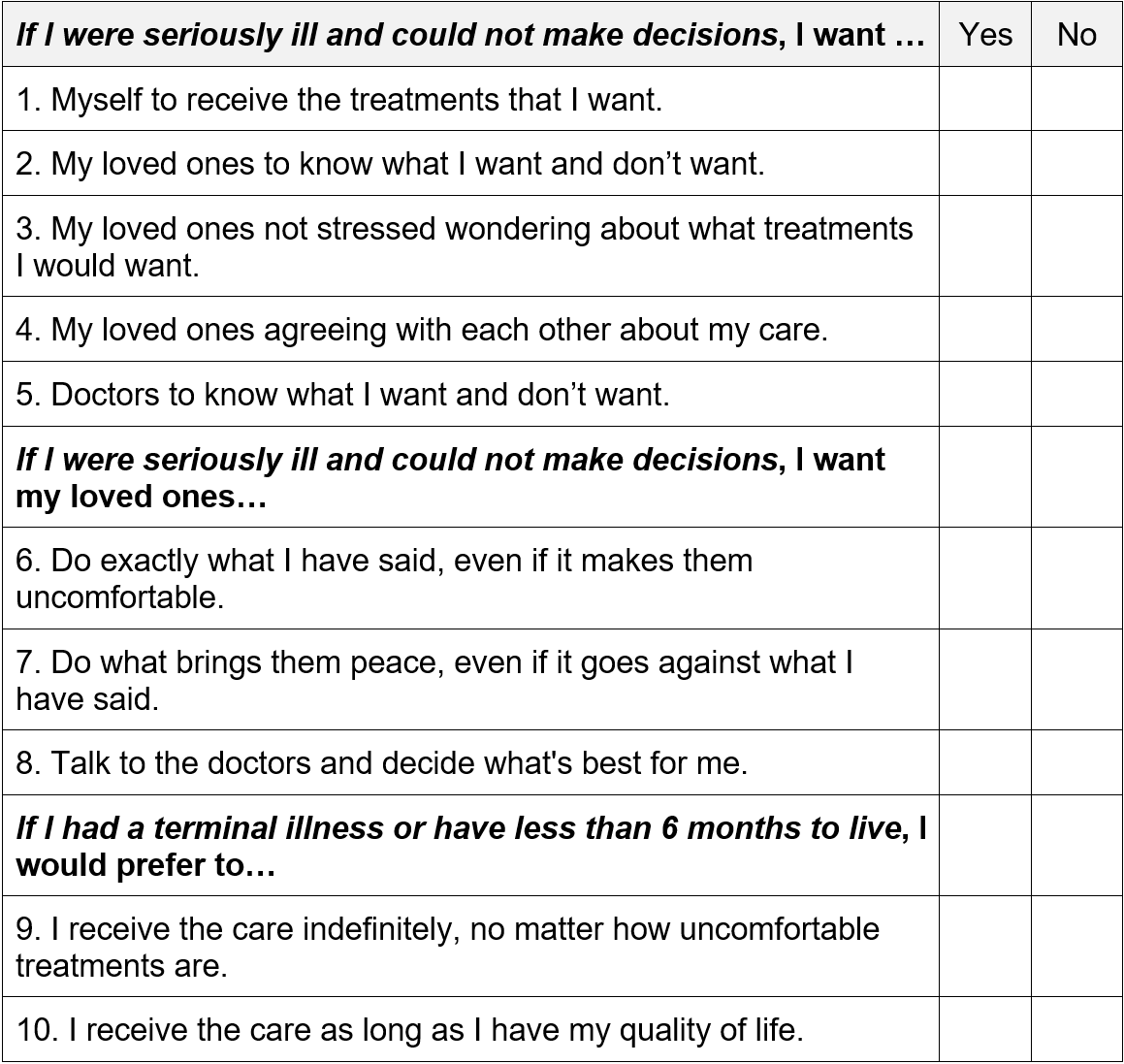Preparing for your
future Healthcare
Advance Care Planning
Online Videos and Value Exploration
Everyone, regardless of age or health, should have conversations about their values, beliefs, and preferences about their healthcare with their families, friends, and healthcare providers. We call this advance care planning.
We do advance care planning so that you can plan for the future, when, and only if, you become too sick and need someone else to make the healthcare decisions the way you want.
On this page, we have included a series of short videos on advance care planning, and a short online value exploration questionnaire designed to help you with advance care planning.
We recommend you watch the videos and complete the short value questionnaire
together with your family member(s)
Advance Care Planning Video Series
1) Introduction to Advance Care Planning
2) The Goals of Care
3) Advance Directives
Advance care planning is about the future. That is, you explore and share with your family, friends and healthcare providers what medical treatments you would want and not want, when, and only if, you become too sick and need someone else to make the healthcare decisions the way you want.
Why do it?
- You receive the care and treatment you want in the future.
- You can help your family plan and avoid stress and conflicts when they will have to make decisions on your behalf.
Why don’t some people do it?
- Some people never heard of it or misunderstand what it is.
- Thinking or talking about health and treatments in the future can be uncomfortable.
Here is a short (7 minute) video with an overview of Advance Care Planning. This video may also be found as the first video at the top of this webpage.
Advance care planning includes 3 steps – (1) talking to families and doctors, (2) asking questions, and (3) writing down your values and preferences about future healthcare.
The Three Steps of Advance Care Planning are:
- Talk to your family and medical doctors. You talk to them about what medical treatments you want and don’t want if you become seriously ill and you can’t make the decision in the future.
- Ask someone to be the person to make the decision on your behalf if you become seriously ill and can’t make the decision yourself.
Click Here to watch a short (5 minute) video with an overview of Advance Care Planning (also found as the second video at the top of this webpage).
- Write your preferences using advance directives. There are at least two types.
- Directive to Physicians and Family/Surrogate
- The directive is about you telling your family or friends, and doctors:
- Your values, beliefs, and preferences, and
- What treatments you want or do not want in the future
- The directive is about you telling your family or friends, and doctors:
- Medical Power of Attorney
- Medical power of attorney is about you naming a person as the medical power of attorney who will:
- Make any and all health care decisions on your behalf, and
- Follow your instructions when making decisions on your behalf.
- Medical power of attorney is about you naming a person as the medical power of attorney who will:
- Directive to Physicians and Family/Surrogate
Click Here to watch a short (5 minute) video about advance directives (also found as the third video at the top of this webpage).
Click here for the Texas Medical Directive to Physicians and Family/Surrogate form
Click here for the Texas Medical Power of Attorney form
Advance care planning is about exploring and sharing how medical treatment decisions should be made if you become seriously ill and you can’t make the decision in the future. That means, you need to think about what matters to you in terms of how decisions should be made, and who should be included in the discussion.
Here, we have listed several statements that can help you explore what matters most to you, and how your loved ones and healthcare providers can help honor your values, beliefs, and preferences.
Please answer if any of the following is important to you if you were seriously ill and could not make decisions for yourself.

- If you answered Yes to Q1 or Q5, we recommend:
- Video 2: Goals of Care (also at the top of the webpage)
- Complete Texas Medical Directive to Physicians and Family/Surrogate form
- If you answered Yes to Q2, Q3, or Q4, we recommend:
- Video 2: Goals of Care (also at the top of the webpage)
- Complete Texas Medical Power of Attorney form
- If you answered Yes to Q6, Q7, Q8, Q9, or Q10, we recommend:
- Video 2: Goals of Care (also at the top of the webpage)
- Schedule a time with your family to explore and share your beliefs, hopes, and wishes.
- Schedule an appointment with your primary care provider to discuss advance care planning.
- Please note Medicare beneficiaries are eligible to receive advance care planning consultations from their doctors or nurse practitioners. Please check with your providers about the Medicare benefits for advance care planning.